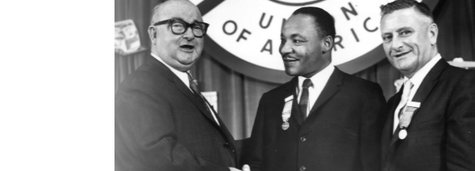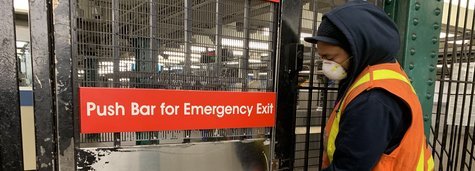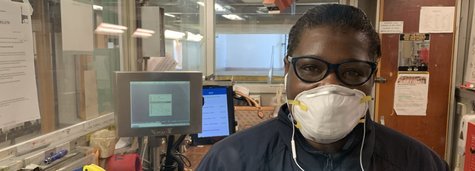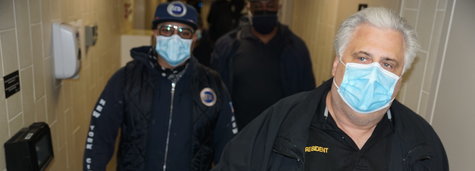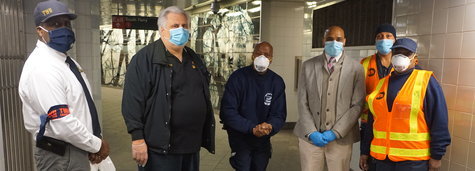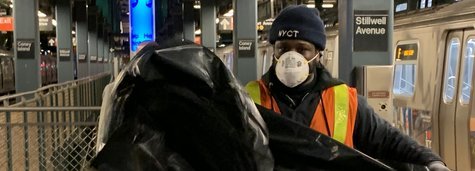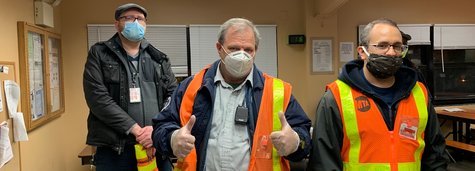Union Pushing Transit on Diesel Fumes
“I’ve watched my friends die because of diesel fumes,” he said. “I’ve watched families torn apart. I’ve gone to funerals where daughters and sons are crying for their parents.”
Mr. Boro addressed a woman in the audience whose husband, Anthony Nigro, passed away after spending 28 years as a Metropolitan Transportation Authority Mechanic.
“Tony...had about 28 years in the system,” he said. “He retired. After about two months, he was diagnosed with lung cancer. A couple months later, he passed away.”
Dorota Nigro explained in an interview that for decades, her husband had worked a morning shift at Michael J. Quill Depot in midtown Manhattan, an older facility that is less well-ventilated and whose garage sits slightly underground. During his 5 a.m. shift, he’d breathe in the fumes from 200-300 buses.
‘Cancer Environmental’
She acknowledged that her husband had once smoked, but said he quit about 23 years before his diagnosis. Many medical researchers believe that 15 years after quitting smoking, the risk of lung cancer falls to roughly that of the general population.
An oncologist told Ms. Nigro he didn’t think the smoking did it.
“The doctor told me, ‘You get yourself a good lawyer,’” Ms. Nigro recalled. “‘Your husband’s cancer is environmental.’”
She said she visited the garage after her husband’s death, and believed the doctor’s claim.
“I was in the garage five minutes. I could taste in the palate of my mouth the soot, the diesel,” she said, observing the black dust that coated the walls. “I asked his partner, I said, ‘Steve, is that what we’re breathing in?’ He said, ‘We’ve been here so long, we don’t smell [it anymore], we don’t taste.’”
The experts at the panel, including prominent occupational-medicine physicians, said it’s time to better protect workers from the effects of diesel fumes, which can cause other respiratory ailments, including Chronic Obstructive Pulmonary Disease (COPD), stroke and cardiovascular illness, and various other life-threatening diseases. More than a million workers around the country are exposed on the job.
EPA, NIOSH Less Certain
While the International Agency for Research on Cancer at the WHO classified diesel exhaust as a definite carcinogen in June 2012, the U.S. Environmental Protection Agency is not as certain, calling it only “likely” to cause cancer in humans. The National Institute for Occupational Safety and Health (NIOSH) has also been conservative, finding it merely a “potential” occupational carcinogen.
But a major 2012 study by the National Cancer Institute and NIOSH followed 12,000 miners for 50 years and found that lung-cancer risk shot up as exposure levels rose, with non-smokers who were subjected to the highest levels seven times more likely to die of lung cancer than those least exposed.
The miners got especially high doses of the gas, but Mt. Sinai occupational health researcher Alice Freund said that some transit workers, including Mechanics, faced on-the-job levels above those of some of the miners.
On his safety rounds, Mr. Boro tells employees to protect against diesel exhaust by making sure their work spaces are properly aired out. He urges them to check maintenance records and ask how often filters are changed in the big fan-like structures in the depots called air-handling units.
Diesel ‘Crushed’ Filters
In the last year, he said, he discovered some work sites where diesel fumes had accumulated to startling levels. At one bus depot, he found that only two of 10 units functioned, and those two “were crushed in, caved in. They weren’t filtering anything. The air was just going around them.”
He was told the filters were changed once a year, which he called “a joke” in New York, where pollution can cause them to turn black within a month, eventually building up a quarter-inch-thick “carpet” of gunk that prevents the diesel fumes from being vented out of the building.
MTA spokesman Kevin Ortiz said of Mr. Boro’s comments,“The health and safety of our employees is a top priority, and as soon as we were made aware of these concerns, we took immediate action. Air monitoring was conducted by our Assistant Safety Contractor as well as a TWU Contractor, and the results were all acceptable. In addition, New York City Transit hired a consultant, an expert in the area of air filtration, and a report was just recently generated that includes recommendations for best operating and maintenance practices and procedures.”
To the MTA’s credit, Mr. Boro said that when he sent officials photos of the filtering system’s sorry state, the agency had safety people on the scene within an hour to begin fixing it.
But he said such improvements can be hard-won, sometimes dependent on finding a sympathetic manager who can help find the finances to solve a problem. The process can take years.
“I’m just gonna tell everybody: don’t give up the fight,” he said. “That’s the bottom bottom line.”

